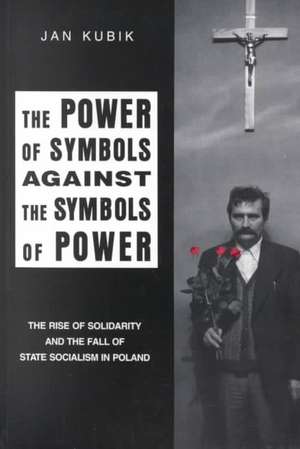The Power of Symbols Against the Symbols of Powe – The Rise of Solidarity and the Fall of State Socialism in Poland
Autor Jan Kubiken Limba Engleză Paperback – 14 apr 1994
Jan Kubik begins his study by demonstrating how the strategy for remodeling the national culture was implemented through extensive use of public ceremonies and displays of symbols by the Gierek regime (1970 1980). He then reconstructs the emergence of the Catholic Church and the organized opposition as viable counter-hegemonic subcultures. Their growing strength opened the way for counter-hegemonic politics, the delegitimization of the regime, the rise of Solidarity, and the collapse of communism.
He is not studying politics per se, but rather culture and the subtle and indirect ways power is realized within it, often outside of traditionally defined politics. Kubik's approach, which draws heavily on modern anthropological theory, helps explain why Solidarity happened in Poland and not elsewhere in the Communist bloc."
Preț: 282.54 lei
Nou
Puncte Express: 424
Preț estimativ în valută:
54.09€ • 55.63$ • 44.87£
54.09€ • 55.63$ • 44.87£
Carte tipărită la comandă
Livrare economică 19 februarie-05 martie
Preluare comenzi: 021 569.72.76
Specificații
ISBN-13: 9780271010847
ISBN-10: 0271010843
Pagini: 336
Dimensiuni: 189 x 227 x 21 mm
Greutate: 0.52 kg
Ediția:New.
Editura: Penn State University
ISBN-10: 0271010843
Pagini: 336
Dimensiuni: 189 x 227 x 21 mm
Greutate: 0.52 kg
Ediția:New.
Editura: Penn State University
Textul de pe ultima copertă
Jan Kubik begins his study by demonstrating how the strategy for remodeling the national culture was implemented through extensive use of public ceremonies and displays of symbols by the Gierek regime (1970-80). He then reconstructs the emergence of the Catholic Church and the organized opposition as viable counter-hegemonic politics. Their growing strength opened the way for counter-hegemonic politics, the delegitimization of the regime, the rise of the Solidarity, and the collapse of communism.













